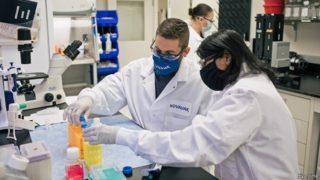But variants of the virus will make vaccinating the world trickier than expected
THE STORY of the past year has been one of fear and hope. Covid-19 has killed 2.2m people around the world. But never have scientists created effective vaccines so quickly. In recent months, however, worrying mutations of the virus have emerged in different parts of the world. The results from clinical trials of two new vaccines, announced in the space of 24 hours this week, are encouraging, but also show that those new variants will make vaccinating the world a lot more complicated than expected.
Novavax, an American firm, tested its vaccine in Britain and South Africa, where two of the variants have emerged. The company announced its results on January 28th. In the British trial, the Novavax vaccine was nearly 90% effective against symptomatic covid-19 when given in two doses 21 days apart. In South Africa, however, the same regimen was only 60% effective (and down to 49% when people with HIV were included)—though these figures are still preliminary and may change.
The vaccine’s lower efficacy in South Africa confirms something that has worried scientists: the virus has already mutated in ways that make vaccines less effective. The British trial of the Novavax jab covered a period when B.1.1.7, a variant that has sent cases in Britain through the roof despite a lockdown, was already widespread locally. Similarly, the trial in South Africa took place when B.1.351, a highly contagious variant first spotted by local scientists, was rampant.
A similar pattern emerged on January 29th when Janssen, which is part of Johnson & Johnson, a big American drugmaker, announced the results for its own covid-19 vaccine. The Janssen vaccine was tested in America, South Africa and Latin America as a one-shot regimen. The results reported are for the vaccine’s efficacy in reducing the incidence of moderate and severe cases of covid-19. That makes it tricky to compare the Janssen jab with other vaccines, which involve two shots and have generally been evaluated against cases that produce even very mild symptoms. In some cases, other vaccines were tested earlier in the pandemic when the mix of variants, prevalence of infections and all sorts of other factors were different.
With these caveats in mind, the Janssen news is, overall, very good. Across all three regions, the vaccine cuts moderate to severe cases of the disease by 66% when measured 28 days after vaccination. Efficacy was 72% in America and not much different in Latin America (66%). As with the Novavax vaccine, it was a lot lower in South Africa, around 57%.
That solidifies the evidence that the B.1.351 variant crushing South Africa is particularly—though not entirely—successful at evading several of the front-running covid-19 vaccines. Laboratory tests for two other vaccines, by Moderna and Pfizer-BioNTech, which are already used widely in America and Europe, have shown that these vaccines may also be less effective against B.1.351.
Several vaccine-makers are already working on modified jabs that target the culprit mutations of B.1.351—similar to the way the seasonal flu shot is tweaked each year to target the particular combination of strains circulating at the time. But unlike the systems that have been tracking flu viruses for decades, spotting vaccine-evading variants of covid-19 has been an ad hoc business. America and other countries are setting up covid-19 variant surveillance but vaccine-evading variants may outpace this in the coming months.
The Novavax and Janssen vaccines, which are almost completely effective against the worst cases of covid-19, are welcome additions to the world’s arsenal of vaccines against the pandemic. Both can be stored in regular fridges for months, which makes them easy to distribute widely. But the revelations from these new trials about how vaccines perform against emerging new variants have made it clear that decisions about what combination of vaccines are best to use where and when will be trickier than expected.
By The Economist





